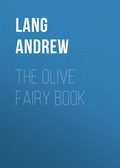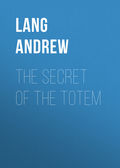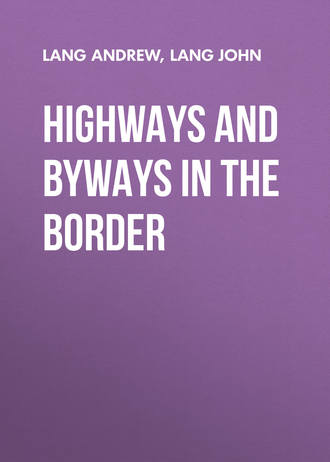
Lang Andrew
Highways and Byways in the Border
Over against Norham is Ladykirk, with its ancient church, dedicated, tradition says, by James IV. to the Virgin Mary, in gratitude for his narrow escape from death here when fording the swollen Tweed. A field to the east of the village shows some, remains of military works, ramparts for guns probably, from which to fire on Norham. In a line between this spot and the castle there was found in the river a stone cannon-ball, fifty-seven inches in girth, probably one fired from "Mons Meg" when she was here in 1497.
Following the light bank of Tweed we reach Carham burn, where Malcolm II. won Lothian in battle; from Carham to the sea the right bank is English. The next important tributary on the English side, as we ascend the stream is Till, formed by Bowmont and Breamish Waters, which rise in the "Cheeviots," as the Scots pronounce the name.
"T weed says to Til'
'What gars ye rin sae still?'
Says Till to Tweed,
'Though ye run wi' speed,
And I rin slaw,
Whaur ye droon ae man,
I droon tw'a.'"
The ominous rhyme sounds with the slow lap of the green-grey waters of Till among her alders, and appears to hint at the burden of the ruinous fight of Flodden.
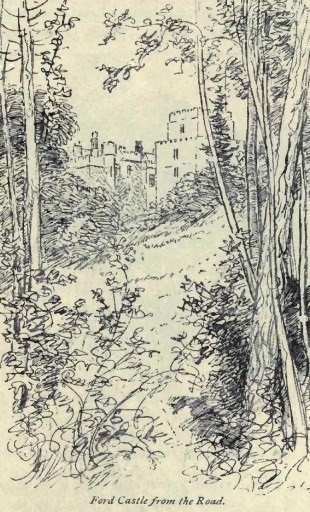
On August 22nd, James IV., "a fey man," kept his plighted word to France, which Henry VIII. was invading, and led the whole force of Highlands and Lowlands across the Border. He made his quarters at Ford Castle, where he did not, as legend says, dally with Lady Heron, still less did his young son, the Archbishop of St. Andrews, fleet the time carelessly with her daughter. James cleared his position by capturing Wark (now scarcely visible in ruin), Chillingham, and Eital castles.

Surrey with the English levies, including the Stanleys, sent a challenge from Alnwick. On September 3rd, the Scots are said to have wrecked Ford Castle, now a substantial and comfortable home, still containing the king's rooms. James crossed the Till by a bridge at Ford, as the tourist also does, if he wishes to see the field of the famous battle. We climb to the crest of Flodden Edge; look south to the wooded hills beyond the Till, and northwards note three declivities like steps in a gigantic staircase.
The Scots were well provisioned, and should easily have held the hill-crest against Surrey's way-worn and half-starved mutinous men.
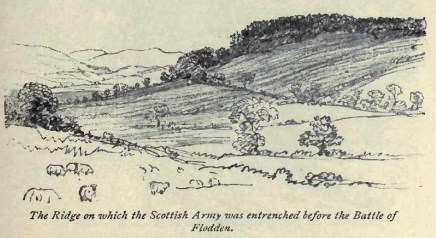
They pitched their camp on the wide level of Wooler haugh, six miles to the right of Flodden; and on this plain Surrey challenged James to meet him, "a fair field and no favour." For once chivalry gave place to common sense in James's mind: "he would take and keep his ground at his own pleasure." But he neglected his scouting, though he had hundreds of Border riders under Home, who should never have lost touch of Surrey. That wily "auld decrepit carl in a chariot" as Pitscottie calls him, disappeared; James probably thought that he was retiring to Berwick. Really, he was throwing himself, unseen, on James's line of communication with the north: he camped at Barmoor wood, and then recrossed Till by Twizel bridge. Scott, in Marmion and elsewhere, blames the king for failing to see this manouvre and discuss Surrey before his men could deploy after crossing by Twizel bridge and at Millford. But Twizel bridge you cannot see from Flodden Edge; Sir Walter had forgotten the lie of the ground. Unseen, the English crossed and formed, advancing from the north towards the second of the three great steps in the declivity, called Branxton hill. In the early evening, Angli se ostentant, the English come into view. In place of holding his ground, which he is said to have entrenched, James yielded to his impetuous temper, fired his camp, and his men throwing off their boots, for the ground was wet and slippery, rushed down to the Branxton plateau.
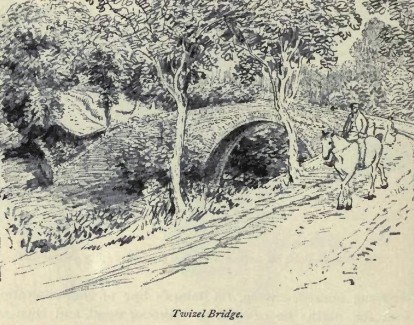
"The haggis, Cott pless her, could charge down a hill," like Dundee's men at Killiecrankie, but the expected impetus must have been lost before James's Highlanders under Lennox and Argyll, his right wing, could come to sword-strokes. James's right, in addition to the clans, had a force led by d'Aussi and Both well, with whom may have been the ancestors of John Knox, as the Reformer told the wild Earl, Queen Mary's lover. The main body, the centre, under the flower of Scottish noblesse, were with the king; who "always fought before he had given his orders," says Ayala, the ambassador of Spain. His left was led by Crawford and Errol; his extreme left by Huntly with the gay Gordons; and Home with his Border spears, mounted men. The English front appears to have been "refused" so that Edward Howard was nearest to Home, and, slanting back wards to the right of James, were the forces of Edmund Howard, the Admiral, the Constable, Dacre, Surrey with the rear, and the large body of Cheshire and Lancashire, led by Stanley.
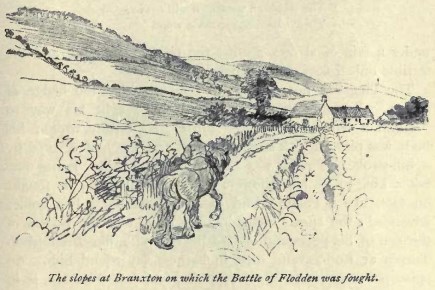
The Admiral sent a galloper to bring Surrey forward; and Home and Huntly charged Edward Howard, while Dacre's Tyneside men ran, as he advanced to support Howard. The Borderers, fond of raiding each other, could never be trusted to fight each other in serious war; they were much intermarried. Brian Tunstal fell, Dacre stopped Huntly; Home's men vanished like ghosts, no man knew whither; for they appeared on the field next morning. Probably they were plundering, but "Down wi' the Earl o' Home," says the old song of the Souters of Selkirk. In the centre of the vanguard the Admiral and the Percys clashed with Crawford and Errol. Both leaders fell, and James threw the weight of his centre against Surrey. To slay that general with his own hand was the king's idea of the duty of a leader. But the English guns mowed down his ranks, and the Scots could not work their French artillery. The king pressed in with Herries and Maxwell at his side; the ranks of England reeled, but the Admiral and Dacre charged James's men in flank. "Stanley broke Lennox and Argyll" on the king's right; the noble leaders fell, and the nimble Highlanders rapidly made a strategic movement in the direction of safety. Stanley did not pursue them, but fell on James's right, which now had the enemy on each flank and in front.
"The stubborn spearmen still made good
Their dark impenetrable wood"
under a rain of arrows, against the charging knights, and the terrible bill strokes of the English infantry.
The king was not content to remain within the hedge of spears. Running out in advance, he fought his way to "within a lance's length" of Surrey, so Surrey wrote; his body was pierced with arrows, his left arm was half severed by a bill-stroke, his neck was gashed, and he fell. James was not a king to let his followers turn his bridle-rein; he fought on foot, like a Paladin, and died with honour. His nobles advanced; the spears defended the dead, and the bodies of thirteen of his peers and of two Bishops who, like Archbishop Turpin at Roncesvaux, died in harness, lay round him. An episcopal ring with a great sapphire, found at Flodden, is in the Gold Room at the British Museum.
Such was the great sorrow of Scotland; there is perhaps not a family of gentle blood in the Lowlands which did not leave a corpse on Branxton slope, where
"Groom fought like noble, Squire like Knight,
As fearlessly and well."
As matter of plain history, this honourable defeat was to my country what, as matter of legend, the rear-guard action of Roncesvaux has been to France. It was too late in literary times for an epic like the Chanson de Roland; the burden of the song was left for the author of Marmiott. But Flodden, till my own boyhood, left its mark on Scottish memories. When any national trouble befell us, people said, "There has been nothing like it since Flodden."
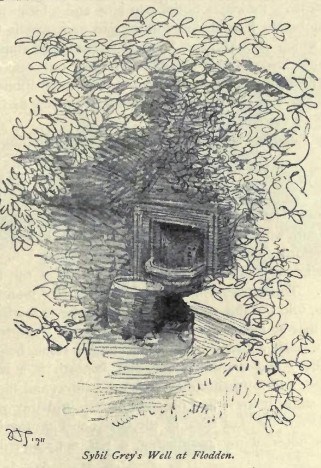
My friend the late Lord Napier and Ettrick told me that when his father took him to Flodden in his boyhood, tears stood n the eyes of the senior.
This is the difference between us of the north, and you of the south. Along the Border line, my heart, so to speak, bleeds at Halidon and Homildon hills, where our men made a frontal attack, out-flanked on either hand by lines of English archers, and left heaps as high as a lance's length, of corpses on corpses, (as at Dupplin); but an Englishman passes Bannock burn "more than usual calm," and no more rejoices on the scene of the victories ol his ancestors, than he is conscious of their defeats. Pinkie is nothing to him, and a bitter regret to us! Dunbar to him means nothing; to us it means the lost chance which should have been a certainty, of annihilating Cromwell's force. Our preachers ruined our opportunity, bidding Leslie go down, in accordance with some Biblical text, from his safe and commanding position, after they had purged our army of the Royalist swords.
Surrey "had his bellyful" at Flodden. In Edinburgh which was hastily erected. But the English general had enough, and withdrew southwards. I visited Flodden Edge on my return from the west of Ireland, where I found the living belief in Fairies. I picked up a trifle of the faith at Flodden. The guide, a most intelligent elderly man, named Reidpath, told me this yarn: "A woman came to my brother," (I knew that he meant a woman of the Faery), "and told him to dig in such a place. He would find a stone, below it a stone pillar; and another stone, and beneath it a treasure. My brother and my father dug, found the stone, and the pillar, and the stone below – but no treasure!" Probably you will not find even this last trace of the fairy belief on the Border, but, from notes of my grandfather, it was not quite dead in his day.
"The old men girt on their old swords,
And went to man the wall,"
Here we leave Till to those who choose to fish it up towards the Cheviots, and move up the right bank of Tweed towards its junction with Teviot.
Before reaching that point, however, there are one or two places to notice on both sides of the river – Coldstream, for example, where Leet water enters Tweed; Eden water, a few miles higher up; and, on the English side, Wark Castle.
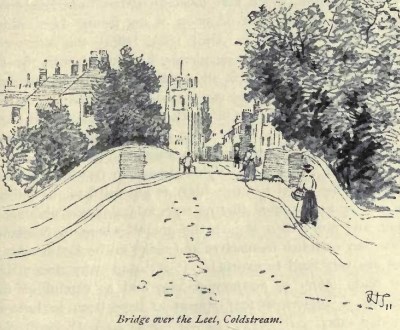
Regarding the Leet, in order to find oneself filled with envy and with longing unutterable, it is only necessary to read Stoddart's account of the fishing to be had in his day in that curious little stream. "Of all streams that I am acquainted with," says Stoddart, "the Leet, which discharges itself into the Tweed above Coldstream, was wont, considering its size, to contain the largest trout. During the summer season it is a mere ditch, in many places not above four or five span in width, and, where broadest, still capable of being leapt across. The run of water is, comparatively speaking, insignificant, not exceeding on the average a cubic foot. This, however, as it proceeds, is every now and then expanded over a considerable surface, and forms a pool of some depth; in fact, the whole stream, from head to foot, pursuing, as it does, a winding course for upwards of twelve miles, is a continued chain of pools, fringed, during the summer, on both sides, with rushes and water-flags, and choked up in many parts with pickerel weed and other aquatic plants. The channel of Leet contains shell marl, and its banks, being hollowed out beneath, afford, independent of occasional vines and tree roots, excellent shelter for trout. Not many years ago the whole course of it was infested with pike, but the visit of some otters, irrespective of the angler's art, has completely cleared them out, and thus allowed the trout, which were formerly scarce, to become more numerous. On the first occasion of my fishing Leet, which happened to be early in April 1841, before the sedge and rushes had assumed the ascendency, I captured, with the fly, twenty-six trout, weighing in all upwards of twenty-nine pounds. Of these, five at least were two-pounders, and there were few, if any, small-sized fish." On another occasion, in June 1846, Stoddart caught in the same water, in four hours, three dozen and five fish, the biggest of which weighed 3 lbs., and a dozen of the others 1 lb. apiece. This stream, in its characteristics so unlike the usual Scottish burn, is not open to the public, but it may be assumed that no such fishing is now obtainable there, any more than it is to be got elsewhere in Scotland. Once they establish themselves and make unchecked headway, pike are very hard to extirpate; it is not in every stream that one finds otters so accommodating, and so careful of the interests of anglers, as they appear to have been in Leet in Stoddart's day.
Coldstream, where Leet joins Tweed, was of old chiefly known for its ford, the first of any consequence above Berwick. It was here that the invading army of Edward the First crossed the river into Scotland in 1296; here, indeed, it was that most armies, English or Scottish, plunged into country hostile to them once they had quitted their own bank of the river; it was here that all Scottish travellers, from royalty to peasant, must halt when southward bound, and await the falling of the waters should Tweed chance to be in flood. Consequently, at a very early date a settlement sprang up, and in it many an historical personage has temporarily sojourned. Sir Thomas Dick Lauder says that as late as his own day an old thatched two storied building in the village was pointed out as the house in which "many persons of distinction, including kings and queens of Scotland, are enumerated by tradition as having resided… occasionally several days at a time," waiting till the river was fordable. It was not till 1766, when Smeaton completed his fine bridge, that any other crossing of the stream than by the ford was possible. In pre-Reformation times, there was in Coldstream a rich Priory of Cistercian Nuns, not a stone of which, however, now remains. But in its little burial ground, between the river and what used to be the garden of the Priory, in 1834 there was dug up a great quantity of human bones, and a stone coffin. The bones were supposed to be probably those of various Scottish persons of rank who fell but a short five or six miles away on the fatal field of Flodden. Tradition tells that the Abbess of that day, anxious to give Christian burial to her slain countrymen, caused the bodies of many Scots of rank and birth to be borne from the field of battle to the Priory, and there laid them to rest in consecrated ground.
Till about 1865 there stood in the village another interesting old house, and on the building which now occupies its site may be read the following inscription: "Headquarters of the Coldstream Guards, 1659; rebuilt, 1865." Here it was that General Monk formed that famous regiment, than which there is but one in the British army whose history goes further back, none which in achievements can surpass it. In one of his works on England at the period of the Restoration of Charles the Second, M. Guizot, the French historian, records that Monk "spent about three weeks at Coldstream, which was a favourable spot for the purpose, as the Tweed was there fordable; but he seems to have found it a dismal place to quarter in. On his first arrival, he could get no provisions for his own dinner, and was obliged to content himself with a quid of tobacco. His chaplains, less easily satisfied, roamed about till they obtained a meal at the house of the Earl of Home, near by." This place, to which the fine instinct of those preachers guided them, was no doubt The Hirsel, which is at no great distance from Coldstream.
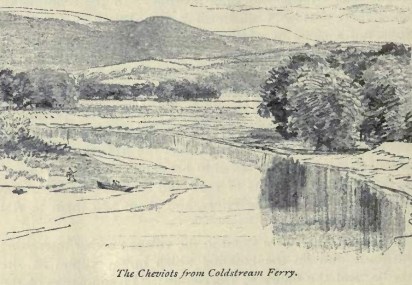
There is yet another thing for which this little town was famed in former days. In the time of our grandsires, and indeed, down to as late a date as 1856, when clandestine weddings were prohibited by Act of Parliament, it was a common sight to see a post-chaise come racing over Coldstream Bridge, or, in days before a bridge existed, splashing through the water from the English side, bearing in it some fond couple (like Mr. Alfred Jingle and the Spinster Aunt), flying on love's wings from stony-hearted parent or guardian. Coldstream was almost as famous a place for run-away marriages as was Gretna Green itself. At the former place, the ceremony was usually performed in the toll-house at the Scottish end of the bridge, where "priests" were always in readiness to tie up the run-away couples, and to issue to them thereafter a Certificate of Marriage, such as the following, which is a copy of one issued in 1836: "This is to certify that John Chambers, Husbandman, from the Broomhouse, in the Parish of Chatton, with Mary Walker from Kelso, in the Parish of Kelso, in Roxboroughshire, was married by me this Day. As witness to my hand, William Alexander, Coldstream, 15th Dec., 1836. Witnesses' names: Miss Dalgleish, Miss Archer."
But though for convenience' sake, and probably for speed of dispatch, the toll-house was chiefly patronised, those who had command of money and were not unduly pressed for time could arrange to have their nuptials celebrated in less public fashion than would probably be the case at the bridge-end. It is I believe an undoubted fact that in 1819 Lord Brougham was married in the chief inn of the village.
Those irregular marriages were in the eighteenth century a great source of trouble and annoyance to the Kirk Session of Kelso. A good many of them at one time were celebrated by a certain Mr. Blair, whom the Privy Council had ejected from the incumbency of Coldstream in 1689 because he had refused to pray for the King and Queen, (William and Mary), and would neither read the proclamation of the Estates nor observe the national thanksgiving. Mr. Blair, however, after the loss of his incumbency continued to live in the village, and, it was alleged, was, in the matter of these marriages sometimes over accommodating and good-natured regarding dates; in his certificates he did not always rigidly adhere to the true day of month or year in cases where it might be represented to him that a fictitious date would be less compromising to the contracting parties. Mr. Blair was "sharply rebukit" by the Session. The reverend gentleman was not in Coldstream later than 1728, and he died at Preston, in Northumberland, in 1736, at the age of eighty-five. The following is the epitaph composed on him:
"Here lies the Reverend Thomas Blair,
A man of worth and merit,
Who preached for fifty years and mair,
According to the spirit.
He preached off book to shun offence,
And what was still more rare,
He never spoke one word of sense —
So preached Tammy Blair."
In examining Scottish Border records of those times, nothing strikes one more than the power of the Kirk Sessions; it is indeed hard to imagine a country more priest ridden than Scotland in the eighteenth century. The "Sabbath" was then as easy to break as a hedge-sparrow's egg, and there were a thousand – to modern eyes not very heinous – ways of breaking it. What in the way of punishment may have been meted out to the unfortunate who fell asleep under the infliction of a long, dull, prosy sermon in a stuffy, ill-ventilated church on a warm summer's day, one hardly cares to conjecture, so rigidly enforced was the duty of listening to sermons; whilst to be abroad "in time of sermon" was sin so heinous that Elders were, so to speak, specially retained to prowl around and nose out offenders. Walking on the Sabbath day – "vaguing," they called it, – was looked on with horror, and called for stern reprimand. In 1710, it was observed that sundry persons in Kelso were "guiltie of profaning the Sabbath by walking abroad in the fields after sermons," and the Session called on the parish minister to "give them a general reproof out of the pulpit the next Loird's Day, and to dehort them from so doing in time coming, with certification that the Session will take strict notice of any one guiltie of it." For less than "vaguing," however, a man might be brought before the Session. In 1710, Alexander Graemslaw of Maxwellheugh was "dilated for bringing in cabbage to his house the last Lord's Day between sermons," and was "cited to the next Session." ("Dilate" is probably less painful than it sounds). He was only "rebuked" about the cabbages: but then they fell on him and demanded an explanation of his not having been at church. Altogether they made things unpleasantly warm for Alexander. In 1708, Alexander Handiside and his son, and a woman named Jean Ker were had up for "walking to and fro on the Sabbath." At first they "compeared not" on being cited, but on a second citation Handiside "compeared," and vainly advanced the plea that his walking to and fro was occasioned by the fact that he had been attending a child who had broken a leg or an arm. He "was exhorted to be a better observer of the Sabbath." A Scot, apparently, might not upon the Scottish Sabbath draw from a pit his ox or his ass which had fallen in. This same year, "those who searched the town" discovered two small boys "playing on the Sabbath day in time of sermon." The Session dealt sternly with the hardened ruffians. Amongst other cases that one reads of there is that of Katherine Thomson. One's sympathies rather go with Katherine, who when reproved by a sleuth-hound Elder for "sitting idly at her door in time of sermon," abused her reprover. But the Session made it warm for a woman who thus not only, as they said, "profaned the Sabbath," but was guilty of "indescreet carriage to the Elder." One trembles to think how easy it was to slip into sin in those days.
But over and above this Juggernaut power of the Session, there was another weapon much used by eighteenth century ministers, whereby they kept a heavy hand on the bowed backs of their congregations. It was their habit, where the conduct, real or fancied, of any member of their flock offended them, to speak at the culprit during service on Sundays, and to speak at him in no uncertain voice. The practice is probably now dead, even in remote country parishes, but fifty years ago it was still a favourite weapon in the hands of old-fashioned ministers, and in the eighteenth century it seems to have been in almost universal use. The Reverend Mr. Ramsay, minister of Kelso from 1707 till his death in 1749, was a dexterous and unsparing wielder of this ecclesiastical flail. It chanced once that there "sat under" him – as we say in Scotland – a Highlander, a man who had deserted from the ranks of the rebel army in the '15, and had afterwards managed to get appointed to a post in the Excise at Kelso. This man's seat in church was in the front pew of the gallery, immediately facing Mr. Ramsay, and his every movement, therefore, was likely to catch the minister's eye. Now, the exciseman had a habit which greatly annoyed Mr. Ramsay. As soon as the sermon commenced, the Highlander produced a pencil, with which he proceeded to make marks on a slip of paper. He may, perhaps, have been making calculations not unconnected with his duties as exciseman, – a scandalous proceeding when he should have been all ears for the Word as expounded by the minister; or, again, on the other hand he may really have been devoutly attentive to the sermon, and engaged in making notes on it, – a thing perhaps not over and above likely in an ex-Highland rebel. In any case he annoyed Mr. Ramsay, and one day the irritation became acute. Pausing in his discourse in order to give emphasis to his words, and looking straight at the exciseman, he cried: "My brethren, I tell ye, except ye be born again, it is as impossible for you to enter the Kingdom of Heaven as it is for a Hielander no to be a thief! Man wi' the keel-o-vine," he thundered, "do ye hear that?" (For the benefit of non-Scottish readers it may be necessary to explain that a "keel-o-vine" is a pencil).
A few miles above Coldstream, after a course of about four and twenty miles, the beautiful little Eden Water joins Tweed. Its capabilities as a trout stream are spoken of elsewhere in this volume, and the little river is now mentioned only to record a tragedy of unusual nature which occurred in it in the earlier half of the nineteenth century. Two young ladies, sisters of the then proprietor of Newton Don, a beautiful estate on the right bank of Eden, had come from Edinburgh to pass the summer and autumn at their brother's house. With them was a friend, a Miss Ramsay. It chanced that one afternoon these three young ladies were walking along the banks of the river, on the side opposite to Newton Don. They had strolled farther than at starting had been their intention, and time had slipped past unnoticed, and while they still had some distance to go on their return way, they were surprised by the sound of the house bell ringing for dinner. Now, a little below the spot where they then were, it was possible to cross the river by stepping stones, an easy, and to every appearance a perfectly safe way by which anybody beyond the age of childhood might gain the other side, without much risk even of wetting a shoe. The three girls, accordingly, started to go over by these stones. The water was low and clear, the weather fine; there had been no thunderstorm that might have been capable of bringing down from the hills a sudden spate; the crossing could have been made a million times in such circumstances without peril greater than is to be met with in stepping across a moorland drain. Yet now the one thing happened that made it dangerous.
At some little distance up stream there stood a mill, the water power of which was so arranged, that if the sluice of the mill should for any reason be suddenly closed, that body of water which normally flowed down the mill dam after turning the wheel, was discharged into the river some way above the stepping stones. In the narrow channel of the Eden at this point, this sudden influx of water was quite sufficient to raise the stream's level to a height most dangerous to anyone who at the time might be in the act of crossing by these stones. Unhappily, at the exact moment when the three poor girls were stepping cautiously and with none too certain foot from stone to stone, and had reached to about mid-channel, the miller, ignorant of their situation and unable from where he stood to command a view to any distance down stream, closed his sluice. Down Eden's bed surged a wave crested like some inrushing sea that sweeps far up a shingly beach. In an instant the three girls, afraid to make a dash for the safety of the hank, were swept off the stones where they clung, and were carried shrieking down the swollen stream. One, Miss Ramsay, buoyed to a certain extent by the nature of her dress, floated until she was able to grasp the overhanging branch of a tree, and she succeeded in getting out. The other two, rolled over and over, buffeted by the sudden turmoil of waters, were swept away and drowned. No one was near to give help; none even heard their cries.
On the southern bank of Tweed, a mile or two up the river from Coldstream and Cornhill, stands all that is left of Wark Castle, a place once of formidable strength, and greatly famed in Border history. Except a few green mounds, and portions of massive wall, there remains now but little to speak of its former greatness, or to remind one of the mighty feats that were performed here during its countless sieges and bloody fights. But the old Northumbrian saying still tells its tale with grim simplicity:
"Auld Wark upon the Tweed
Has been mony a man's dead."
Regarding this couplet, the following comment is made in the Denham Tracts: "Mark's history, from the twelfth down to at least the sixteenth century, is perhaps without a parallel for surprises, assaults, sieges, blockades, surrenders, evacuations, burnings, restorations, slaughters. These quickly recurring events transformed the mount on which the castle stood into a Golgotha, and gave a too truthful origin to the couplet which still occurs on the Borders of the once rival kingdoms." The castle was erected during the reign of King Henry I., by Walter d'Espec, somewhere about the year 1130; and before it had been many years in existence, in 1135, David I. of Scotland captured it. From that time onwards, at least down to 1570, when Sussex spent a night within its walls on his way to harry Teviotdale, there is not one item of that formidable list of "surprises, assaults, sieges, blockades, surrenders, evacuations, burnings, restorations, slaughters," that has not been amply borne out by its history, many of them again and again. David took it in 1135, but restored it to England in the following year. Twice afterwards, the same monarch vainly attempted to take it by storm, but finally, after the fall of Norham, he reduced it by means of a long blockade. After this it remained in Scottish possession till 1157, when England again seized, and at great expense rebuilt, the castle. In 1216 it was destroyed by fire; in 1318, reduced by King Robert the Bruce; in 1385, taken by storm by the Scots. Then in 1419, William Halliburton of Fast Castle surprised the English and took the castle, putting all the garrison to the sword. But the same fate was dealt out to the Scots themselves a few months later; Sir Robert Ogle and his men gained access to the building by way of a sewer from the kitchen, which opened on the bank of Tweed. Creeping up this unsavoury passage, they in their turn surprised and slew the Scotsmen. Again in 1460, after the widow of James II. had dismantled Roxburgh and razed it almost to the foundations, the Scots forded Tweed and retook Wark. But they did not hold it long. More valuable now to the English than ever it had been before, owing to the loss of Roxburgh, it was partially repaired by them, only, however, to be again pulled down by the Scots before the battle of Flodden; after which Surrey for the last time restored and strengthened it. After the accession of James VI to the throne of England, Wark, like other Border strongholds, began to fall into decay; the need for them was gone. Buchanan, the historian, has left a description of Wark as it was in 1523, when he was with the Scottish army at Coldstream, which then besieged it. "In the innermost area," he says, "was a tower of great strength and height; this was encircled by two walls, the outer including the larger space, into which the inhabitants of the country used to fly with their cattle, corn, and flocks in time of war; the inner of much smaller extent, but fortified more strongly by ditches and towers. It had a strong garrison, good store of artillery and ammunition, and other things necessary for defence."




